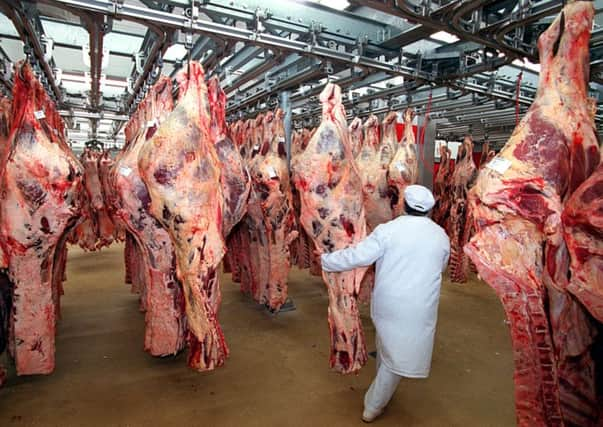Meat plants '˜need EU workers' claim wholesalers
This article contains affiliate links. We may earn a small commission on items purchased through this article, but that does not affect our editorial judgement.


Looking to the post-Brexit future this week, Allan Jess, president of the Scottish Association of Meat Wholesalers (SAMW), said the need for continued freedom to employ the EU workers on which many meat sector businesses depended was “absolutely critical” for the industry.
He said that the meat trade had come to rely on workers from other European countries partly because the domestic skill base wasn’t sufficiently geared towards the butchery skills his industry required.
Advertisement
Hide AdAdvertisement
Hide Ad“This means that if the government take a tough stance on our present and future worker requirements, it will also have to invest in new education and skills training to give us the UK-based people we need,” he said. “Turning the worker supply tap off without turning the skills tap on won’t work.”
He said that while Scotland’s meat wholesalers were upbeat about business prospects in 2017, many of the opportunities on offer for next year were depend on politicians and regulators delivering favourable conditions for the industry to prosper.
Jess also expressed fears that post-Brexit Britain would aim to protect itself against “inferior” imports by raising domestic standards above levels achieved in other countries.
Calling such an approach “naïve”, he said that it failed to take into account the extent to which product prices drove the mass market for food.
“As an industry and as a nation, we already apply extremely high standards to our food production, because we believe in doing things correctly,” he said. “Going even further, however, beyond what is either reasonable or necessary, will merely add costs of our industry and hand sales to cheaper alternatives.
“Having said all that, Brexit is definitely an opportunity for us, provided the UK’s negotiators are successful in creating a new and positive platform for business. We will therefore be pressing the government very hard in 2017 to grasp the opportunities on offer, rather than succumb to the pressures.”
Jess warned that while getting Brexit under the right terms was crucial, the industry shouldn’t lose its focus in other areas. He said that SAMW members had an industry to run, businesses to develop and objectives to meet and they had no intention of standing still while the politicians talked.
He added that the industry, as one of the most highly regulated in the UK and the EU, was 100 per cent in support of professional, reliable and traceable processing standards but warned against “box-ticking operations” which, although having the appearance of protecting the public, often actually delivered “precious little”, he said.
